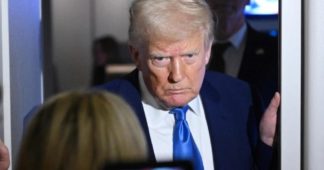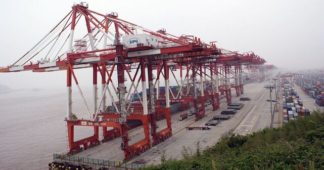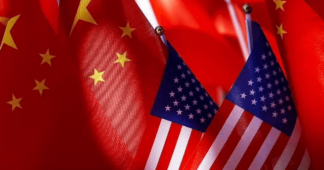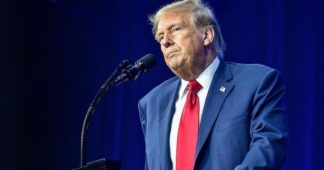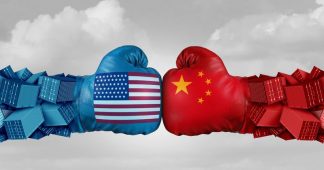China has taken forceful countermeasures to defend its interests, the State Council said.
Apr. 9, 2025
On Wednesday, the Chinese Finance Ministry announced raised tariffs on U.S. goods from 34% to 84%. This decision was in response to the additional 50% tariff announced yesterday by U.S. President Donald Trump, who increased the tariff on Chinese goods to 104%.
The new Chinese tariffs will take effect on April 10 and are a response to the “repeated mistake” of the United States increasing its tariffs on China.
The Chinese Trade Ministry also added 12 U.S. firms to its export control list, including equipment manufacturers and engineering companies, some of which are related to drones (BRINC), aeronautics (Novotech), machinery (Marvin Engineering Company), and radars (Echodyne).
It also added six other companies to its untrustworthy entities list, including military equipment suppliers such as Cyberlux and Sierra Nevada.
On Wednesday, the State Council of the People’s Republic of China also released a report titled “China’s Position on Some Issues Concerning China-U.S. Economic and Trade Relations.”
This 53-page document emphasizes that, as the world’s largest developing country, China is also the biggest contributor to annual global economic growth. As the largest developed country, the United States possesses the largest economy in the world.
Due to this fundamental situation, China-US economic and trade relations are of profound significance for both countries and have a substantial impact on global stability and development.
The State Council report also highlights that over the 46 years since the establishment of diplomatic relations between China and the US, bilateral trade and economic ties have developed steadily.
“The volume of trade between the two countries has surged from less than US$2.5 billion in 1979 to nearly US$688.3 billion in 2024,” it states, noting that bilateral trade has made a significant contribution to both countries’ economic and social development.
Since the onset of the trade friction in 2018, however, U.S. protectionism has significantly impeded the normal course of economic and trade cooperation between the two countries.
“So far, the U.S. has imposed tariffs on Chinese exports worth more than US$500 billion. Furthermore, it has continuously implemented policies aimed at containing and suppressing China,” the April report pointed out.
“The Chinese side has had to take forceful countermeasures to defend its national interests. At the same time, committed to resolving disputes through dialogue and consultation, the Chinese side has engaged in multiple rounds of economic and trade consultations with the US side to stabilize bilateral economic and trade relations,” it added.
— Chinese Embassy in US (@ChineseEmbinUS) April 9, 2025
The State Council report also noted that the United States and China signed a trade agreement on January 15, 2020. Nonetheless, Washington has continuously tightened export controls, escalated sanctions against Chinese enterprises, and repeatedly violated its obligations under the Agreement.
A concrete example of the above can be seen in documents such as the America First Trade Policy Memorandum, the America First Investment Policy Memorandum, and the Report on the America First Trade Policy.
Citing the fentanyl issue as a pretext, these instruments of US foreign policy imposed comprehensive additional tariffs on Chinese products, announced “reciprocal tariffs,” levied an additional 50 percent on existing tariffs, and proposed Section 301 investigation restrictions, such as charging port fees and targeting China’s maritime, logistics, and shipbuilding industries.
“These restrictive measures have escalated the problem and once again reveal the isolationist and coercive nature of US conduct. They conflict with the principles of the market economy, run counter to multilateralism, and will have serious repercussions for China-US economic and trade relations. In accordance with the fundamental principles of international law and relevant laws and regulations, the Chinese side has taken necessary countermeasures,” the State Council report pointed out.
“The US imposition of tariffs and other restrictive trade measures on its trading partners has artificially disrupted established global supply and industrial chains, undermined market-oriented free trade rules, severely hindered the economic development of various countries, harmed the wellbeing of both the American people and those of other countries, and negatively impacted economic globalization,” it added.
“The Chinese side has always maintained that China-US economic and trade relations are mutually beneficial and win-win in nature. As two major countries at different stages of development with distinct economic systems, it is natural for China and the US to have differences and frictions in their economic and trade cooperation. It is crucial to respect each other’s core interests and major concerns and find proper solutions to resolve the issues through dialogue and consultation,” the April report concluded.
We remind our readers that publication of articles on our site does not mean that we agree with what is written. Our policy is to publish anything which we consider of interest, so as to assist our readers in forming their opinions. Sometimes we even publish articles with which we totally disagree, since we believe it is important for our readers to be informed on as wide a spectrum of views as possible.
